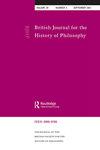Razian prophecy rationalized
IF 0.7
2区 哲学
0 PHILOSOPHY
British Journal for the History of Philosophy
Pub Date : 2023-08-04
DOI:10.1080/09608788.2023.2235613
引用次数: 0
Abstract
Ab¯u Bakr Muh.ammad bin Zakariyy¯a’ al-R¯az¯ı (865–925) is generally known as a freethinker who argued against prophecy and revealed religion based on arguments from fairness of God and rationality. Recently some scholars argued that Razi was not as radical as the general interpretation takes him to be. Both the freethinker and conservative interpretations seem well supported based on difference bodies of evidence. However, the evidence is based on secondhand reports. In this paper I argue there is an interpretation of prophecy which is supported by primary sources and can reconcile these putatively contradictory positions. Under my interpretation Razi allows for prophecy based on the rationality of moral deference in certain circumstances. In this picture one function of prophets is to act as moral experts for deference. This interpretation provides a synthesis of the freethinker and conservative views. Razi is conservative in having room for prophecy because of his dualist nature of humanity, and Razi is still a freethinker who values reason above all, because moral expertise requires excellent command of reason.拉兹预言合理化
Ab’u Bakr Muh.ammad bin Zakariyy’a’al-R’az’ı(865–925)通常被认为是一位自由思想家,他反对预言,并基于上帝公平和理性的论点揭示了宗教。最近,一些学者认为拉齐并不像一般的解释那样激进。自由思想家和保守派的解释似乎都是基于不同的证据。然而,证据是基于二手报告。在本文中,我认为有一种对预言的解释,它得到了主要来源的支持,可以调和这些假定的矛盾立场。根据我的解释,拉齐允许在某些情况下基于道德尊重的合理性进行预言。在这幅图中,先知的一个功能是充当道德专家以获得尊重。这种解释综合了自由思想家和保守派的观点。拉齐在预言空间上是保守的,因为他对人类的二元本性,而拉齐仍然是一个自由思想家,他把理性看得高于一切,因为道德专业知识需要对理性的卓越掌控。
本文章由计算机程序翻译,如有差异,请以英文原文为准。
求助全文
约1分钟内获得全文
求助全文
来源期刊

British Journal for the History of Philosophy
PHILOSOPHY-
CiteScore
1.10
自引率
16.70%
发文量
78
期刊介绍:
BJHP publishes articles and reviews on the history of philosophy and related intellectual history from the ancient world to the end of the 20th Century. The journal is designed to foster understanding of the history of philosophy through studying the texts of past philosophers in the context - intellectual, political and social - in which the text was created. Although focusing on the recognized classics, a feature of the journal is to give attention to less major figures and to disciplines other than philosophy which impinge on the history of philosophy including political theory, religion and the natural sciences in so far as they illuminate the history of philosophy.
 求助内容:
求助内容: 应助结果提醒方式:
应助结果提醒方式:


